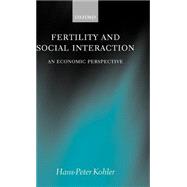Fertility and Social Interaction An Economic Perspective
, by Kohler, Hans-Peter- ISBN: 9780199244591 | 0199244596
- Cover: Hardcover
- Copyright: 11/29/2001
Considerable controversy exists among demographers, economists, and sociologists over the causes of fertility change in developing and developed countries. The neoclassical economic approach to fertility is embraced by its supporters because it facilitates the application of sophisticatedconsumer and household production theory to one of the most private and intimate questions: a couple's reproductive behavior. Despite the theoretical appeal of the economic approach, it has been eschewed by many critics because of its lack of social and institutional context, its neglect of culturalfactors, and its requirement of 'rationality'. The integration of social interaction with economic fertility models in this book emerges as a powerful tool to overcome many of these criticisms. First, the analysis provides a formal integration of economic, sociological, and other approaches tofertility, and shows that there is a useful and promising agenda at the intersection of these schools. The second and more important goal is to sharpen the analytic lens with which theorists from different schools investigate fertility. For economists the work shows the advantages of moving beyondindividual decision-making and embedding fertility decisions in a 'local environment' with interpersonal information flows, 'atmospheric' or social externalities, norms, and customs. For sociologists the work shows that theorizing about interactions within social networks can be more sophisticated.The implications of social networks depend substantially on the specific contexts and stages of the demographic transition, and these differences can be used to empirically distinguish between social learning and social influence. Thirdly, the findings have important implications for populationpolicy. The analyses in this book indicate when family planning is likely to diffuse and lead to rapid adoption of birth control, and they derive conditions where Pareto-improving policy measures are likely to exist.






